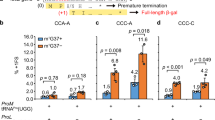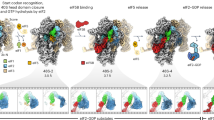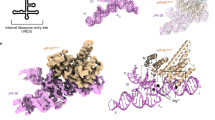Abstract
INITIATION of eukaryotic protein synthesis involves the assembly of a functional initiation complex from components including ribosomal subunits, initiator tRNA (Met-tRNAF), initiation factors, messenger RNA, ATP and GTP1–3. Much research in this area has centred on the possible control of eukaryotic translation at the level of polypeptide initiation, as this step seems to be rate-limiting in the overall synthetic reaction4,5. Some studies have suggested the existence of tissue-specific initiation factors6, others have described initiation factors which apparently discriminate between eukaryotic mRNAs7. Work in this laboratory led to the purification of an initiation factor of molecular weight 53,000 from the supernatant fraction of Krebs II ascites cells8. This factor (IFEMC) was shown to be required for the translation of encephalomyocarditis virus RNA (EMC RNA) but not for globin mRNA translation in a fractionated ascites cell-free system9. Other studies on the translation of mRNAs injected into living Xenopus laevis oocytes10, and on the translation of various mRNAs in several crude eukaryotic protein-synthesising systems11 have suggested, however, that eukaryotic translation proceeds without controls exerted by specific initiation factors. We have adopted a comparative approach to this problem, examining the translation of various eukaryotic mRNAs in a fractionated cell-free system from Krebs II ascites cells, and testing the specificity of two mammalian factors reported to be required for the initiation of natural mRNA translation.
This is a preview of subscription content, access via your institution
Access options
Subscribe to this journal
Receive 51 print issues and online access
$199.00 per year
only $3.90 per issue
Buy this article
- Purchase on SpringerLink
- Instant access to full article PDF
Prices may be subject to local taxes which are calculated during checkout
Similar content being viewed by others
References
Schreier, M. H. & Staehelin, T. Nature new Biol. 242, 35–38 (1973).
Staehelin, T., Trachsel, H., Erni, B., Boschetti, A. & Schreier, M. H. Proc. tenth FEBS Meeting 39, 309–323 (1975).
Crystal, R. G., Elson, N. A. & Anderson, W. F. Meth. Enzym. 30 (eds. Grossman, L. & Moldave, K.), 101–127 (Academic, New York, 1974).
Lodish, H. F. & Jacobsen, M. J. biol. Chem. 247, 3622–3629 (1972).
Lodish, H. F. Nature 251, 385–388 (1974).
Heywood, S. M. Proc. natn. Acad. Sci. U.S.A. 67, 1782–1788 (1970).
Nudel, U., Lebleu, B. & Revel, M. Proc. natn. Acad. Sci. U.S.A. 70, 2139–2144 (1973).
Wigle, D. T. Eur. J. Biochem. 35, 11–17 (1973).
Wigle, D. T. & Smith, A. .E Nature new Biol. 242, 136–140 (1973).
Gurdon, J. The Control of Gene Expression in Animal Development, 55–61 (Oxford University, 1974).
Haselkorn, R. & Rothman-Denes, L. B. A. Rev. Biochem. 42, 397–438 (1973).
Rekosh, D. M. K. in The Molecular Biology of Animal Viruses (ed. Nayak, D.), (Dekker, New York, in the press).
Safer, B. et al. Proc. natn. Acad. Sci. U.S.A. 73, 2584–2588 (1976).
Smith, A. E. & Wigle, D. T. Eur. J, Biochem. 35, 566–573 (1973).
Hellerman, J. G. & Shafritz, D. A. Proc. natn. Acad. Sci. U.S.A. 72, 1021–1025 (1975).
Benne, R. & Pouwels, P. H. Molec. gen. Genet. 139, 311–319 (1975).
Steitz, J. A. & Jakes, K. Proc. natn. Acad. Sci. U.S.A. 72, 4734–4738 (1975).
Marcker, K. A., Blair, G. E., Dahl, H. H. M. & Lelong, J. C. Proc. tenth FEBS Meeting 39, 297–307 (1975).
Author information
Authors and Affiliations
Rights and permissions
About this article
Cite this article
BLAIR, G., DAHL, H., TRUELSEN, E. et al. Functional identity of a mouse ascites and a rabbit reticulocyte initiation factor required for natural mRNA translation. Nature 265, 651–653 (1977). https://doi.org/10.1038/265651a0
Received:
Accepted:
Issue Date:
DOI: https://doi.org/10.1038/265651a0



